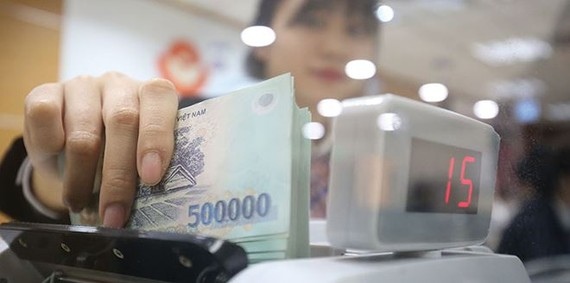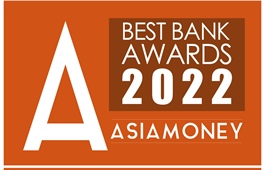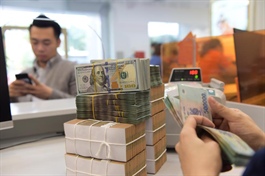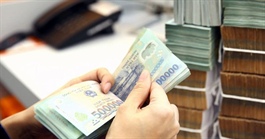Current monetary policy quite suitable
Current monetary policy quite suitable
Many people are concerned whether the country will face a tighter monetary policy and higher exchange and interest rates in the near future.
Illustrative photo. |
The market is seeking satisfactory answers to such queries, while policymakers are weighing their best options, and experts expressing varied opinions. But the actual ground situation proves that the current monetary policy in Vietnam is quite appropriate at present.
Interest and exchange rates
Soon after the Covid-19 pandemic became less severe, concerted efforts were made for a speedy economic recovery because Vietnam badly needs significant economic growth so as to avoid the middle-income trap. The national economy in general and the companies in particular need substantial amounts of capital for recovery.
However, post pandemic there is much more uncertainty and risks factors are increasing, along with global fluctuation becoming more complicated and national policies worldwide constantly changing in an increasingly unpredictable manner. Such changes pose potential risks and challenges to Vietnam’s economic growth, macroeconomic stability, inflation, and large imbalances in the short, medium, and long term.
Many experts believe that the management of our monetary policy is extremely difficult in the present circumstances. It is always hard to successfully control inflation and also prevent an economic recession at the same time. It requires both technique and skillful management to choose appropriate policies during periods of high inflation, big macroeconomic risks and difficult production phase.
The State Bank of Vietnam is trying to resolve the management puzzle with lots of different variables. Among these, the most challenging variable includes how to control inflation and supply money to promote economic growth. It is essential to control inflation and maintain macroeconomic and monetary stability, yet it is vital to also ensure safety in the activities of credit institutions and also ensure liquidity for foreign currency and exchange markets.
Such variables as interest rates, exchange rates, money supply and credit room play a key role in this large puzzle, and these are currently the hottest issues. Most countries have chosen to sacrifice economic growth for inflation control by means of a tighter monetary policy and a higher interest rate. Mr. Andrea Coppla, Chief Economist representing the World Bank in Vietnam, believes that Vietnam still has to face the risk of inflation, and if inflation rises to 4% compared to the expected level, interest rates must be tightened.
The question is whether the State Bank of Vietnam should raise interest rates in the future, and if not, it means that the State Bank of Vietnam must sell off foreign currency reserves to stabilize the exchange rate. According to Prof. Andreas Hauskrecht, from Indiana University in the US, Vietnam should not devalue the dong, nor raise interest rates because it could cause financial instability.
Dr. Trương Văn Phước, former Acting Chairman of the National Financial Supervisory Commission, said that it is necessary to try to stabilize interest rates to keep the exchange rate stable. He said that the exchange rate is a defensive measure, an important line of defense in the battle against inflation. If this line breaks, inflation will flood in.
Dr. Lê Xuân Nghĩa, a member of the National Financial and Monetary Policy Advisory Council, also emphasized that keeping the exchange rate stable makes a very important contribution to inflation control, and if the exchange rate increases, the price of imported goods will increase and cause a negative impact on inflation.
Mr. Francois Painchaud, representative of the International Monetary Fund (IMF) in Vietnam and Laos, said that if inflation continues to rise, the State Bank of Vietnam must tighten the monetary policy and use tools such as interest rates and credit growth and foreign exchange intervention.
Sufficient credit room
Mr. Nguyễn Minh Cường, Chief Economist of ADB in Vietnam, said that Vietnam should not be too hasty in taking any action because of the pressure created by other countries trying to tighten their currencies. Instead, Vietnam should be flexible in maintaining macroeconomic stability and pave the way for significant growth, production, and business recovery.
Mr. Cường is highly appreciative of Vietnam’s flexible monetary policy, which has been effective in both controlling inflation and promoting growth. The 14% credit ceiling that the State Bank of Vietnam has set is reasonable because it is based on such goals as controlling the inflation rate at 4% and economic growth rate at 6% to 6.5%.
Vietnam did not rush into the race of tightening the currency to fight inflation but chose other options to bolster both recovery and macroeconomic stability. It was a decision based heavily on the fiscal policy. Dr. Võ Trí Thành, Director of the Institute for Brand Development and Competition, said that this option has proven reasonable in that it put less pressure on inflation and created greater room to cope with risks and uncertainties.
Many people are wondering whether or not it is necessary to extend the credit room. Many experts strongly believe that during a time of uncertainty like this, the State Bank of Vietnam must remain more determined and cautious about management of its monetary policy, with the 14% credit growth rate being reasonable.
Dr. Võ Trí Thành said that if the credit limits were loosened, it would put too much pressure on both exchange rates and also interest rates. According to him, Vietnam's 14% credit growth rate is not too high, nor too low. In fact, the State Bank of Vietnam has allowed the credit growth rate to be higher now than in the past two years in an effort to foster a speedy economic recovery in the current context of global financial markets being tightened and higher inflation pressure.
Many experts support the idea of controlling inflation, maintaining macroeconomic stability, promoting economic growth, and stabilizing the money markets. The monetary policy should be managed flexibly and carefully in harmony with the fiscal policy, exchange rate stability and reasonable credit growth rates. In the short term, the credit growth limits cannot be removed, but other reasonable measures must be considered for more effective credit management.
International credit rating agencies, such as Moody's, have warned that Vietnam's credit-to-GDP ratio is currently over 124% and the percentage of total assets of credit institutions to the GDP is about 187%. This means that financial leverage is currently very large, which could create financial risks in the future if credit space were extended at present.



























